As businesses increasingly prioritize sustainability in their operations, industry leaders offer valuable insights into navigating this shift. Patrick Westerburger, Managing Partner at Kestria Netherlands, interviewed Eline Oudenbroek, VP of Supply Chain & Operations EMEA at Interface, who shares her perspective on the critical role of supply chain management in driving sustainable practices. Eline discusses how Interface's commitment to environmental stewardship not only enhances operational efficiency but also contributes to a positive impact on the planet.
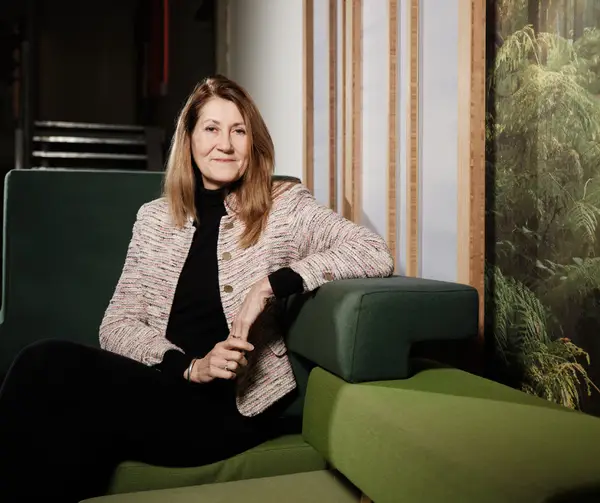 Eline has been recognized as #1 Supply Chain Director in The Netherlands in 2024.
Eline has been recognized as #1 Supply Chain Director in The Netherlands in 2024.
Could you briefly introduce yourself in relation to Interface’s remarkable journey in sustainability?
I hold a degree in chemical engineering and have spent my career in the metal industry, primarily in manufacturing, and equipment dealerships working for both family-owned businesses and private equity firms. As an interim director, I realized the need to join a larger company like Interface, where the complexity of the role aligns with the challenges found in larger organizations. Smaller private equity firms are fast-paced and focused on financial performance, often under intense scrutiny, similar to family-owned businesses.
I realized I needed a broader network of colleagues who could offer alternative perspectives and help me learn from my peers. The complexity of working in a global, multi-functional organization also appealed to me, as it would enhance my communication and stakeholder management skills. While most move from larger corporations to smaller businesses, I am glad I took the opposite path.
In addition to my role as Vice President of Supply Chain for EMEA at Interface, I hold two supervisory board positions. One is with an employee-owned engineering consultancy firm where I chair the board, and the other is a large private equity-owned business specialised in the sales of agricultural, construction and logistic equipment. . These roles have given me valuable hands-on experience across diverse business environments, beyond what one can learn from theory alone.
At Interface, my chemical engineering background has been valuable, particularly in product circularity and innovation. While my mechanical expertise remains relevant, Interface’s focus on sustainability and product development allows me to apply my knowledge to strategic, future-oriented projects. The company’s 30-year commitment to sustainability, even as a publicly listed firm, is what attracted me the most.
How can innovation be effectively implemented and what are the key success factors over the decades?
Having a visionary like Ray Anderson at the helm for many years made a profound impact on Interface. Though Ray has passed, his influence continues to shape our journey. Those who worked with him now pass on his approach to sustainability, always with a focus on commercial viability. Ray saw sustainability and profitability as inseparable. His motto, "make the call," emphasized the need to engage with customers, while also warning them of future challenges if sustainability wasn't prioritized, viewing costs in a broader, strategic context.
Ray was one of the first investors in solar panels in the U.S., recognizing how reduced energy costs could enhance the company's value proposition and justify the investment. His commitment to sustainability was clear through collaborations with pioneers like Paul Hawken.
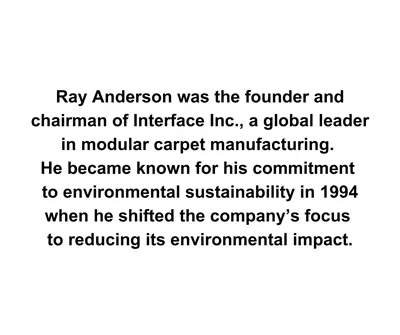
The first critical key factor is having a leader with a long-term vision, understanding of the synergy between sustainability and commercial success - because without financial sustainability, broader change is impossible. The second is implementing clear programs. For 25 years, Interface championed Mission Zero to eliminate any negative environmental impact, shifting from fossil fuel-based raw materials. After achieving this with bio-based backing, we launched Climate Take Back aimed to actively regenerate the planet.
Our initial mission was to do no harm; now, it focuses on regeneration. Every part of this vision must align to keep us at the forefront of sustainability, building on 30 years of leadership. Well-designed programs and reinvestment in innovation are essential. Ray foresaw the importance of these issues as early as 1994, showcasing his forward-thinking approach.
How do you ensure that innovations are brought to life with the teams you're working with?
There are clear incentives for setting and achieving goals at Interface, alongside strong intrinsic motivation among employees. While personal preferences are allowed, a mindset like driving a Hummer likely wouldn't last here, as everyone, from the work floor to management, is aligned with our goal of regenerating the planet.
Sustainability is embedded within our organizational goals. Each year, top management sets specific targets, including science-based targets and our journey towards 100% recycled and bio-based content, currently at 82% across our product range. A key goal was introducing carbon-negative products, where more purchases benefit the planet. While this product may serve as an attention-grabber, all our products are carbon neutral and align with our Mission Zero, though not all are fully regenerative yet.
Could you explain the challenges of achieving bio-based backing and how you overcame them?
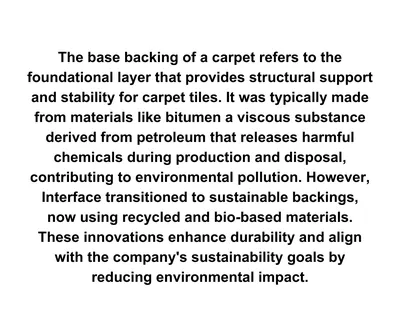
It took us seven years to achieve this. During the COVID period, we made significant investments and implemented new equipment to ensure that all our products are carbon neutral by applying the revolutionary CQuest™Bio backing. The yarn used for the top layer also incorporates recycled content—100% reuse of discarded fishing nets and plastics. In collaboration with our yarn supplier, these materials are collected and re-polymerized into high-quality yarns. There is no visible difference in the quality, but we know that much of it is primarily derived from reused fishing nets.

How did your chemistry background help drive those initiatives?
In two ways: First, an engineering background enables the analysis of data and provides a clear understanding of the necessary steps for new product development.
Second, specific chemical knowledge is essential for comprehending raw materials—whether they are bio-based from plant sources or bio-based alternatives to chemical components. Achieving this bio-based transformation requires fluency in chemical terminology, including the ability to understand molecular structures and how to re-engineer molecules that were traditionally derived from petrochemicals.
"No relevance without sustainability" is one of your quotes - could you clarify that?
Have you seen the movie Blackberry? It shows how frontrunner products, once loved by consumers, lost relevance despite strong marketing and efficiency. They lacked the foresight to anticipate the next 20 to 30 years and failed to invest to stay leaders. Even the best products become obsolete if they no longer meet future needs, much like typewriters when no one wanted them anymore.
This forward-thinking approach is ingrained in Interface’s leadership. we are highly selective in appointing top leadership. Recruitment at this level is never swift, as we seek individuals with a deep commitment to sustainability, a strong strategic vision, and the ability to manage teams across diverse countries and cultures. Many leaders at Interface have been with the company for years, including those who worked with Ray Anderson from the beginning.
What value does your global presence bring to shape your future strategy?
Each continent has its own strategic focus. Europe leads in sustainability, with CSRD regulations from the EU now applied globally. In the Americas, the focus is on logistical challenges due to the region's size. Cultural differences, like those between California and Texas, offer valuable insights.
In Asia, there is a stronger focus on spirituality and creating an engaging workplace. Surveys like "Great Place to Work" often show how effectively they involve people. While their approach differs from Europe’s, these contrasts spark valuable discussions.
In Minto, near Sydney, Australia, challenges like flooding and bushfires mirrored those in the Americas. Different regions face unique issues.
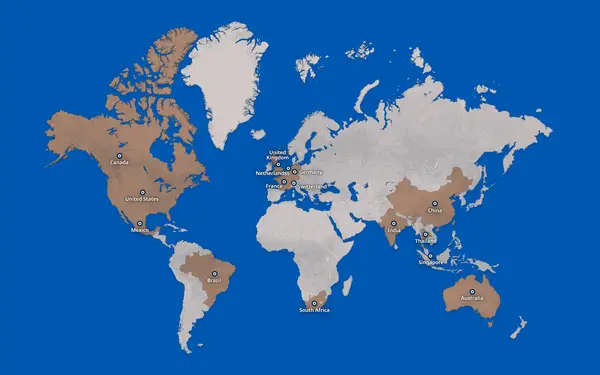 Interface’s locations around the world
Interface’s locations around the world
How do your non-executive board roles bring value to your daily work at Interface?
There are two key aspects. First, observing how other companies face challenges and applying those experiences to my work. Do we encounter similar risks? Are we addressing them the same way? For example, at Tauw, the engineering consultancy firm, their focus on the built environment, water management and drone measurements provides insights into future trends and the capabilities of an engineering firm. It’s also interesting to see a different business model - operating as a consultant rather than a producer.
In my other board role at Reesink, primarily a dealership for agricultural machinery, highlights how market changes, like climate change, impact the sector and potentially Interface. For example, understanding agricultural developments is key with bio-based backing, and these insights help me address relevant topics at Interface.
The second aspect is gaining a different perspective. As a supervisory board member, you observe leadership from a distance, focusing on strategy, risks and team dynamics. I value how building the right teams strengthens a company. While strong products and processes matter, collaboration and enhancing team strengths are key to growth.
I gained this understanding from turning around family-run and private equity businesses from near bankruptcy. While this approach worked for smaller companies, as a supervisory board member, it becomes even clearer that success is all about having the right people in the right roles. I see this in other companies too - things may run smoothly for a while, but sometimes a change in leadership is needed, and it’s often easier to recognize that from the board than from within the leadership team.
You've been praised for your sharp mind, humor and perseverance. How do these traits influence your decision to join a supervisory board?
In a vice president role, humor may not be essential but offers advantages. A sharp mind is vital for focusing energy, asking vital questions and assessing success. Humor fosters connections, facilitating important discussions about your role. The Dutch, like the British, have a dark sense of humor, and combining this with humility is effective in addressing tough topics.
Tackling difficult issues is inevitable, as tough decisions often require "soft skills," which I find challenging to master. It's crucial to identify individuals who can take on leadership roles and have the responsibility, time, energy, and perseverance to see a project through. In change management, restructuring, and layoffs, perseverance is needed from both me and those implementing the changes.
I’ve seen remarkable transformations in companies within one or two years, with struggling businesses becoming high-performing. Recently at Interface, we restructured regional leadership, increasing the Great Place to Work survey driving response rates to 90%. This indicates strong employee engagement and participation. Although this area faced significant challenges and a strike two years ago, new leadership has fostered clear understanding and well-defined goals. This turnaround required perseverance from the leaders and tough decisions on my part.
When deciding to join a board, I must ensure I bring relevance to the role. If a company needs a razor-sharp financial perspective, they should seek someone with a private equity or M&A background. My strengths lie in change management and people skills, including experience with works councils, which I find particularly engaging. The company must align with sustainability values can not conflict with my role at Interface. A lack of a strong connection with the chair would also be a dealbreaker, as I believe a solid relationship with the chair and CEO is crucial.
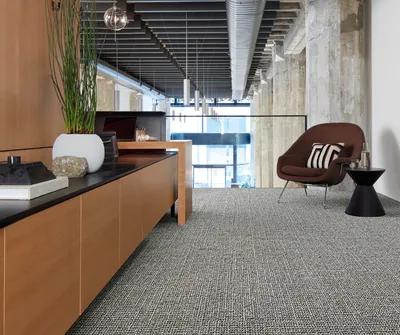
What makes a VP Supply Chain successful?
Success comes from identifying your company's relevance and making it visible. It's essential to be vocal and drive your company’s success by excelling in your role. Our commitment to achieving science-based targets also encourages other companies to join us. For example, the fishing net yarn project, which we started with a supplier, is now used by the entire industry. We are proud to have been involved from the beginning, and ultimately, this innovation should be accessible to everyone.
The same applies to our re-entry initiative, aiming to take back used tiles for repurposing. If reuse isn't possible, we'll recycle by separating the yarn from the backing. We’ve focused on making these products last up to 15 years without wear. The next challenge is disassembling the materials and returning the yarn to the supplier for recycling and using the backing material again in our own process. While challenging, perseverance and vision in addressing these issues is important.
What does the VP Supply Chain of the Year Award mean to you?
I am particularly proud to be the first female winner in a field where women are underrepresented, especially given the limited number of female contestants. Supply chain management is gaining visibility, with some predicting that future CEOs will come from this background. The supply chain is where vision becomes reality, turning ideas into tangible products. This is why I value this recognition.
We often say, "We make the magic happen." While others envision magic, we turn it into sellable products and services that improve the planet. As a chemical engineer, I take pride in this field, given that the term "chemical" doesn't always carry the best connotation. I admire those at companies like Exxon, Shell and Tata Steel who strive to make a difference, as progress is impossible without advocates for change.
I am pleased to see the growing recognition of the supply chain field through awards celebrating excellence. This interest in acknowledging top professionals highlights our vital role in enhancing the world and driving our company's success.
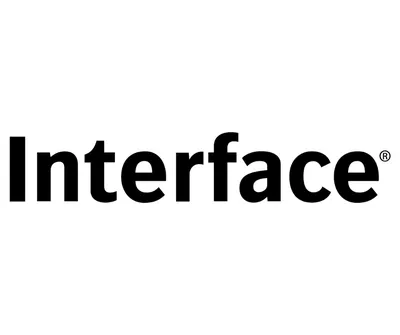
Interface is a global leader in modular flooring and carpet tile solutions, renowned for its commitment to sustainability and innovative design. Founded in 1973, the company has transformed the flooring industry by integrating environmentally friendly practices into its manufacturing processes, aiming for a carbon-negative future. Interface’s products are designed to minimize environmental impact while maximizing aesthetic appeal and performance, offering a wide range of styles and functionalities. With a strong focus on circularity, the company not only creates durable flooring options but also actively works to recycle and repurpose materials. Recently, Interface won the Reuters Award for Sustainable Leadership, due to having a sustainability manager in every country to raise awareness. Through its efforts, Interface continues to set a benchmark in the industry, inspiring others to adopt sustainable practices.


